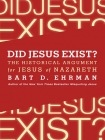Did Jesus Exist? - The Historical Argument for Jesus of Nazareth by Bart Ehrman (ebook reader browser .TXT) 📗

- Author: Bart Ehrman
Book online «Did Jesus Exist? - The Historical Argument for Jesus of Nazareth by Bart Ehrman (ebook reader browser .TXT) 📗». Author Bart Ehrman
In sum, there is no evidence to support Doherty’s contention that for Paul and the Christians before him Jesus’s death took place in the spiritual rather than the earthly world, effected by demons instead of humans. But there are many other reasons to reject this view.
Did Mark, Our First Gospel, Invent the Idea of a Historical Person, Jesus?
WE HAVE SEEN THAT most mythicists maintain that the early Christians believed in a divine Christ modeled on pagan dying-rising gods or, in the case of G. A. Wells, in a Christ who was Wisdom made incarnate. It is widely thought among those who hold such views that the Jesus of the Gospel tradition—the Jewish teacher and prophet of Galilee who did miracles and then was crucified by the Romans—is an invention of our first Gospel, Mark. The later Gospels then derived their views, and many of their stories, from him. This view is suggested in several places by Wells29 and is stated quite definitively by Doherty: “All the Gospels derive their basic story of Jesus of Nazareth from one source: the Gospel of Mark, the first one composed. Subsequent evangelists reworked Mark in their own interests and added new material.”30 Throughout this study I have addressed this issue piecemeal in the context of other discussions. Here I would like to tackle it head-on to show that it is almost certainly not correct.
To begin with, there are solid reasons for doubting that the Gospel of John is based on Mark or on either of the other two earlier Gospels, even though the matter is debated among scholars.31 But the reality is that most of the stories told about Jesus in the synoptic Gospels are missing from John, just as most of John’s stories, including his accounts of Jesus’s teachings, are missing from the synoptics. When they do tell the same stories (for example, the cleansing of the Temple, the betrayal of Judas, the trial before Pilate, the crucifixion and resurrection narratives) they do so in different language (without verbatim overlaps) and with radically different conceptions.32 It is simplest to assume that John had his own sources for his accounts. And I should stress yet again that even if John did know the earlier Gospels, they did not provide him with most of his stories about Jesus as these, generally, are not found in those other books.
I should stress as well that some of these sources lying behind John stem from the early years of the Jesus movement, as is evident in the fact that some of them still betray their roots in Aramaic-speaking circles of Palestine. This puts them (some of them) in the early days of the movement, decades before Mark was written.33
Whatever one decides about the Gospel of John, it is clear that Matthew and Luke used narratives of Jesus’s life and death that were independent of Mark. The sources I have called M and L contain accounts, not only of Jesus’s words and deeds but also of his Passion, that differ from those in Mark. Even more telling, Luke explicitly informs us that “many” authors before him had produced accounts of the things Jesus said, did, and experienced. Mark by itself is not “many.” Other Gospels, in addition to Mark, were produced. It is regrettable that some of Luke’s other predecessors did not survive, but there is no reason to think he is lying when he says that he knows about them. And when he summarizes his Gospel at the beginning of his second volume, the book of Acts, it is clear that in his mind a full narrative of “the things accomplished among us” (as he describes the accounts of his predecessors in Luke 1:1) include not only what Jesus said and did but also the accounts of his Passion, up to the narrative of the ascension (Acts 1:1–4). Mark did not make up this kind of narrative. There were others. Luke writes his simply because he thinks he can do a better job.
In addition, Luke indicates that these kinds of narratives were based on what was being told by “eyewitnesses and ministers of the word” (1:2). In other words, Luke admits that even before there were written accounts of Jesus’s life and death, these stories were being passed along orally, from the very beginning. The apostle Paul knew several of the people who passed along such stories, as we have seen, as he mentions traditions that he inherited from believers before him (1 Corinthians 11:22–24; 15:3–5) and names several of Jesus’s close intimates as personal acquaintances: the disciples Cephas and John, along with Jesus’s brother James.
The idea that Christians were telling stories of Jesus’s life, death, and resurrection before Luke, before Mark, and before Paul is held by virtually all scholars of the New Testament, and for compelling reasons. As I earlier pointed out, the only way the early Christians—starting in the months after Jesus’s death—could have propagated their beliefs, converting first Jews and then Gentiles to believe in Jesus, was by telling stories about him. Before he converted, Paul had heard some of these stories, at least those about Jesus’s crucifixion but almost certainly other stories as well. If he was offended that this Jew in particular was the one being called the messiah, it means he must have known something about Jesus in particular (it is possible of course that all Paul knew was that followers of Jesus were calling him a crucified messiah and that he knew absolutely nothing else, but that does require a bit of a stretch of the imagination). In any event, Paul certainly knew other stories about Jesus soon after he converted in 32–33 CE, as he provides information about Jesus’s birth, teachings, family, ministry, Last Supper, and crucifixion in





Comments (0)